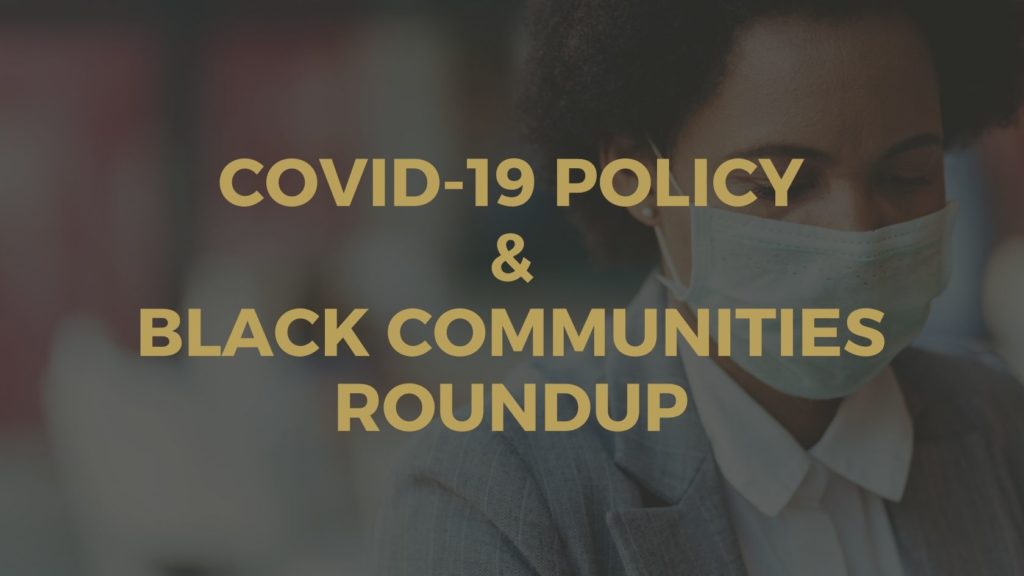
June 2 COVID-19 Policy & Black Communities Roundup
Taking Action Against Anti-Blackness
At the Joint Center, we join with millions around the world in calling for an end to the continued marginalization of Black life that resulted in the deaths of Eric Garner in New York, Sandra Bland and Atatiana Jefferson in Texas, Jordan Davis in Florida, Walter Scott in South Carolina, Ahmaud Arbery in Georgia, Breonna Taylor in Kentucky, George Floyd in Minnesota, and countless others. Today, the Joint Center, the Leadership Conference on Civil and Human Rights, and dozens of other groups sent a letter to Congress with a list of federal reforms on police accountability.
But anti-Black violence is a symptom of a deeper problem—the treatment of Black people in the United States. We see other symptoms in many areas—including the COVID-19 crisis—which has resulted in higher rates of Black deaths, unemployment, and business closures. This deeper problem is systemic—it transcends individual “bad actors”—and has historic origins that shape our contemporary institutions.
Many of us are feeling tired and hopeless, and it can seem easier to accept the challenges faced by Black communities as “normal” or inevitable. Some of us just don’t know where to start.
But those who harbor anti-Black attitudes are relying on just that.
People of all backgrounds have a role to play in addressing anti-Blackness. For example, as we grapple with the long-term implications of the pandemic and rebuild, many of us have key platforms in government, the private sector, philanthropy, academia, the media, a social or professional organization, or another institution. None of us can do it all—but by each doing our own part we can create new systems designed so that Black communities can thrive.
We are looking forward to partnering with many of you on this work with sustained commitment even after the protests have subsided.
Wishing you strength and clarity during these difficult days,
Spencer
Senate Republicans Will Consider “Fourth and Final” Stimulus Bill in About a Month
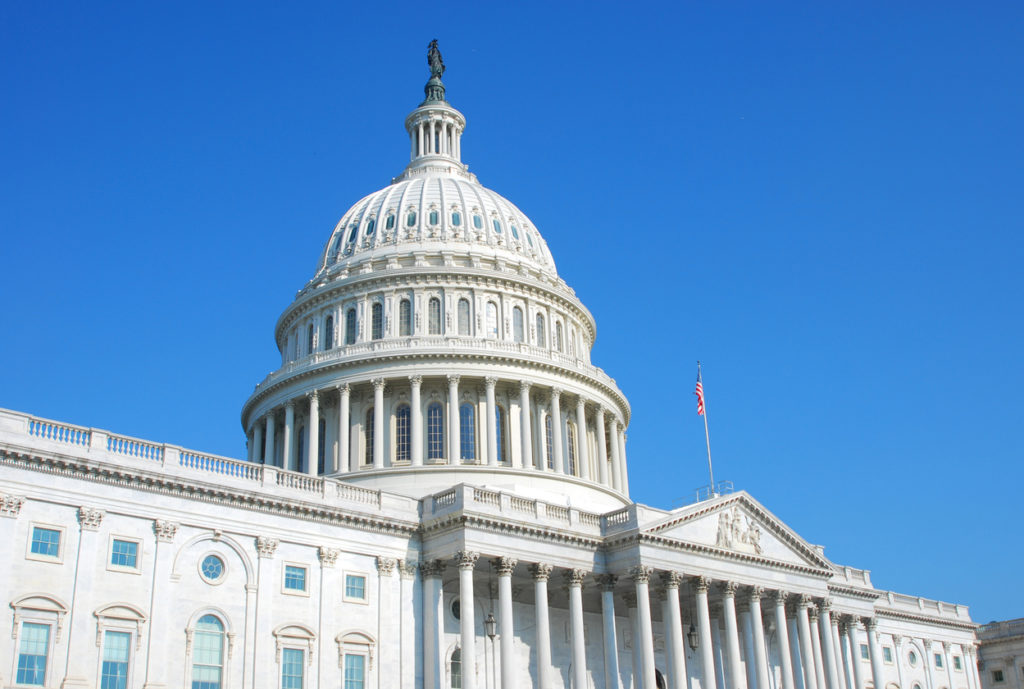
Both the Republican-led Senate and the White House have gone on record with their opposition to the HEROES Act, the $3 trillion coronavirus relief bill passed by the House. On Friday, Senate Majority Leader Mitch McConnell stated that Senate Republicans will consider a “fourth and final” coronavirus relief bill “in about a month” that will focus on “jobs and schools,” and possibly “small business and health care.” He expressed opposition to “extending the additional $600 per week in federal unemployment benefits that run out at the end of July.”
Among the priorities of Republicans for additional coronavirus stimulus funding is limiting corporations’ liabilities in coronavirus-related lawsuits. The Economic Policy Institute (EPI) asserts that legislation shielding corporations from accountability for the safety of workers—along with weak federal enforcement of existing worker protections—eliminates legal incentives to adhere to health and safety guidelines.
Resistance to quick passage of the HEROES Act is also coming from some Senate Democrats who want stimulus spending to be more targeted “to people who are really hurt” than previous COVID-19 relief measures as states begin reopening their economies. Senate Minority Leader Chuck Schumer (D-NY) is reported to be considering automatically tying unemployment benefits to economic conditions.
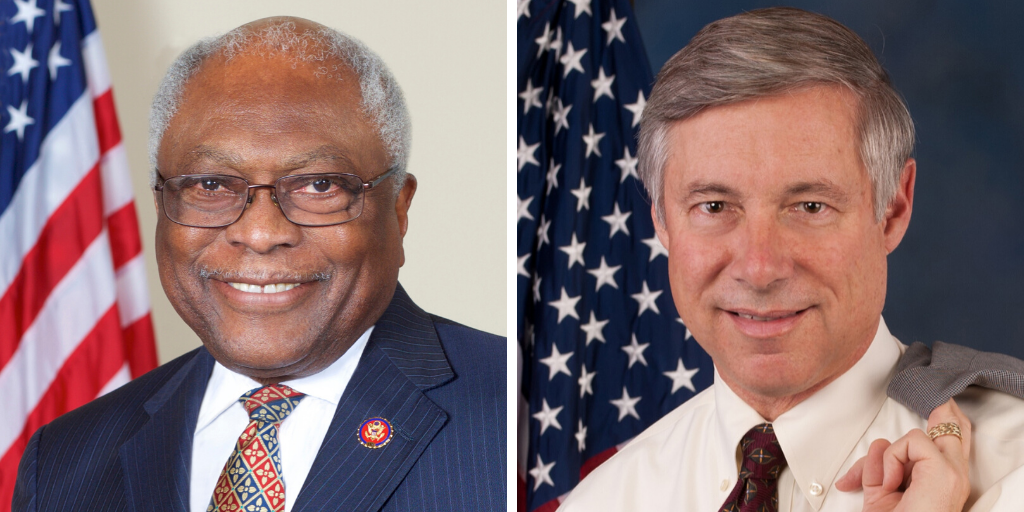
In response to disparities in access to affordable and reliable broadband internet exposed by the COVID-19 crisis and the increased reliance on telework, telemedicine, and distance learning, House Majority Whip James E. Clyburn (D-SC) and Congressman Fred Upton (R-MI) introduced the Rural Broadband Acceleration Act, which directs the Federal Communications Commission to fast-track funding of shovel-ready, high-speed internet projects.
Reduction in Payroll Requirement for Small Business Loan Forgiveness Passes House
The House passed bipartisan, stand-alone legislation to reduce the proportion of funds that are required to be used on payroll costs in the Paycheck Protection Program (PPP) from 75% to 60%, and would extend the time during which businesses must spend the money to qualify for loan forgiveness from 8 weeks to 24 weeks. Titled the Paycheck Protection Program Flexibility Act, the legislation was introduced by Congressman Chip Roy (R-TX) and Congressman Dean Phillips (D-MN). The Senate, which failed to move its own set of PPP reforms prior to going on break last week, is expected to address the issue this week. AP provides context to challenges Black businesses face during the pandemic in accessing PPP funds.
Of the total $660 billion allocated as Paycheck Protection Program funds, as of May 29, $510 billion in loans had been distributed and the average loan size was $114,144.
For more on Congress and COVID-19, see the National Urban League’s Washington Bureau Insider.
Economic Studies & COVID-19
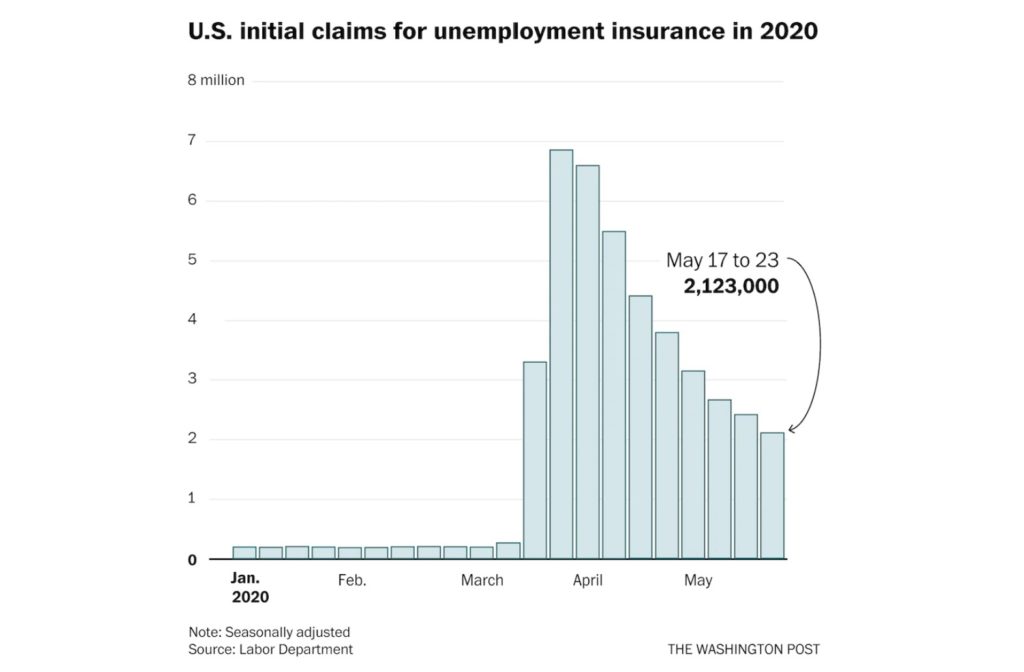
Last week’s data release from the U.S. Department of Labor shows another 2.1 million unemployment claims filed the week ending May 23, bringing the total number of claims reported to more than 40 million as a result of the coronavirus pandemic. The single-week high prior to the current crisis was 695,000 in 1982.
ABC News reported that “African American hairstylists, who are often classified as freelancers or independent contractors, still face challenges,” as some states have not paid out Pandemic Unemployment Assistance funds or are still figuring out who qualifies. Some stylists have gone seven weeks without an income and face an additional financial burden without the tips from their clients that balanced out their income.
The Economic Policy Institute (EPI) reported that there were 7.8 million continued Pandemic Unemployment Assistance (PUA) claims and 3.3 million initial PUA claims as of May 23, not including 15 states and the District of Columbia. Heidi Shierholz, Senior Economist and Director of Policy at EPI stated that “things like occupational segregation, discrimination, and other labor market disparities” mean that workers of different races experience recessions differently. Shierholz, a former Chief Economist to the U.S. Secretary of Labor, also urged Congress to provide more funding to state unemployment agencies to speed up processing and to extend the supplemental $600 weekly increases.
The Georgetown University Center on Education and the Workforce analyzed data from the US Census Bureau from April 23 to May 5 and found that those without a college degree, young people (18 to 24 years old), people living in low-income households, and those who have historically faced prejudice and discrimination are among the most affected by the coronavirus crisis. They found that 56% of Black adults are most likely to have suffered a loss of employment income in their households, compared to 44% of white adults.
The Washington Post reports that journalists of color “are particularly susceptible to layoffs, and that can distort coverage of the crisis” as newsrooms continue to reduce staff during the pandemic. Tauhid Chappell, a board member with the Philadelphia Association of Black Journalists expressed concerns that the lack of diversity in the newsroom may contribute to inadequate and unfair coverage of communities of color.
In “Black Workers, Already Lagging, Face Big Economic Risks,” the New York Times reports that African Americans make up 11.9% of all workers but 17% of front-line workers, that less than half of Black adults now have a job, and have less income, wealth, and home ownership due to discrimination.
Color of Change President Rashad Robinson penned an article calling on elected officials and corporate leaders to offer direct financial assistance to Black and brown businesses, prohibit negative credit reporting during the pandemic, and demand demographic data to identify recipients of federal assistance.
Political Studies & COVID-19
Joint Center President Spencer Overton joined National Association of Latino Elected Officials (NALEO) CEO Arturo Vargas for the Knight Foundation’s conversation on “capturing the votes of all Americans” during the COVID-19 crisis. Spencer provided insight on the upcoming election and equitable voting practices for Black Americans amid the COVID-19 pandemic.
Several have grappled with police violence, protests, and police tactics at protests leading to a spread of COVID-19, including The Verge, LA Times, LAist, The Atlantic, and NPR.
Stateline, an initiative of The Pew Charitable Trusts, examined whether states are taking measures to curve COVID-19 cases and deaths in Black communities. Stateline analyzed COVID-19 protection methods in 16 states where Black residents make up a larger than average (13%) of the state’s population. Most states in the study are in the process of convening task forces and research studies that examine racial health disparities. Some additional measures identified include: targeting Black communities for additional testing and contact tracing; distributing personal protective equipment, engaging trusted local community organizations, including Black churches and historically Black colleges and universities to assist with outreach, providing temporary housing for those infected with COVID-19 to limit the spread of the virus, and financial assistance for lost wages when under quarantine, as well as other social services.
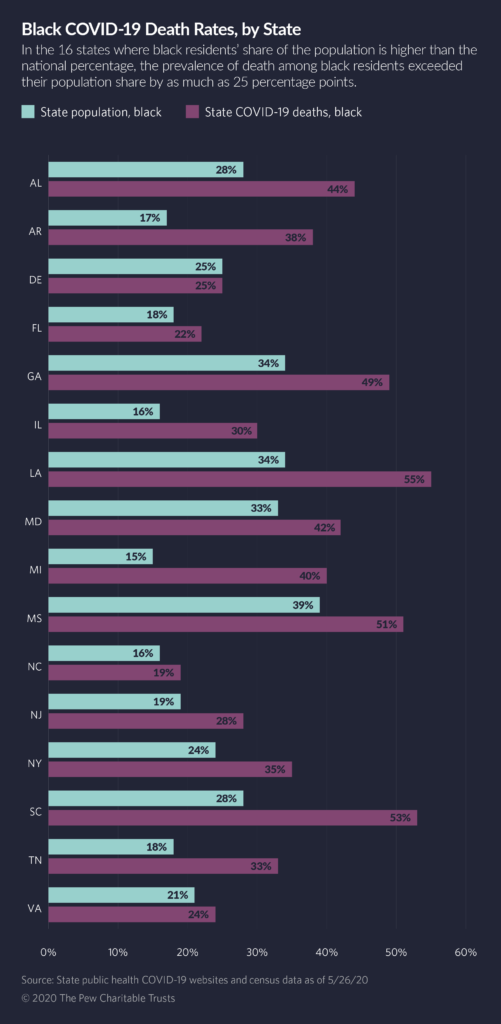
The Pew Research Center found that “the places hit hardest by the coronavirus outbreak – which have relatively large shares of ethnic and racial minorities and residents living in densely populated urban and suburban areas – are almost all represented by congressional Democrats.”
Dissatisfaction continues to mount over inadequate COVID-19 victims’ data. Politico reports that at least a dozen states “have inflated testing numbers or deflated death tallies by changing criteria for who counts as a coronavirus victim and what counts as a coronavirus test.” The Satcher Health Institute at Morehouse School of Medicine received a $1 million grant from Google.org to collect and analyze detailed racial and socioeconomic data to better understand why Black communities and other communities of color are disproportionately impacted by COVID-19. The data will be used to help policymakers appropriately direct resources to targeted areas.
Augusta University found rural Black counties have the highest COVID-19 death rates in Georgia.
Analysts and doctors continue to search for an explanation as to why Black people are infected and dying at disproportionate rates from COVID-19. The Lancet Respiratory Medicine published findings from autopsies of 10 African Americans who died from COVID-19 and found that blood clots were consistent in all victims. CNBC shed light on the Centers for Disease Control (CDC) data showing that African American account for nearly 23% of reported COVID-19 deaths in the U.S. as of May 20. Jared DeWese, a senior communications advisor at Third Way opined in The Hill that air pollution is a contributor to African Americans falling prey to COVID-19. A small exposure to air pollutants is associated with a 15% increase in the death rate from COVID-19, which is especially concerning because many African Americans live in or near communities with high levels of air pollution.
PHI Vice President of Policy Robert Espinoza and AARP Global Thought Leadership Senior Vice President Jean C. Accius penned an article for the American Society on Aging outlining seven racial equity strategies to support older people of color during the pandemic. Strategies include ensuring real-time reporting on racial and ethnic disparities related to COVID-19, and implementing a racial equity lens in service delivery and workforce development in the aging community.
Organizing
The National Urban League is partnering with Wells Fargo to provide housing security for renters and homeowners in response to COVID-19.
The Advancement Project, The Center for Constitutional Rights, The Fair Fight Initiative, Hogan Lovells LLP, and local civil rights attorneys filed a federal lawsuit to protect people inside East Baton Rouge Prison from the threat of COVID-19.
National Black Worker Centers co-sponsored a petition demanding that all Walmart workers receive hazard pay and that Walmart’s hourly workers are able to participate in an emergency COVID-19 task force.
Project South and the Hunger Coalition of Atlanta are hosting various mobile testing sites throughout Atlanta through June 12.
The National Bail Fund Network is coordinating funds to support the release of people in local and county jails to protect them from COVID-19.
Black Wealth 2020, described as a coalition of Black organizations with members in banking, business, and home ownership sent a letter to Congressional leaders urging them to support the HEROES Act. The letter was signed by National Bankers Association former president Michael Grant, US Black Chambers CEO Ron Busby, and other principals of the following organizational members of Black Wealth 2020: The National Association for Equal Opportunity in Higher Education (NAFEO), National Association of Black Owned Broadcasters, HomeFree-USA, National Association of Real Estate Brokers (NAREB), National Association of Securities Professionals, and the Collective Empowerment Group Professionals.
Events
Upcoming events include “Leveraging Technology to Advance Inclusion: A week-long online forum” (Urban Institute, June 1-5); “Supporting Women-Owned Businesses During the COVID-19 Era” (New America, June 2), “A Roadmap for Reopening America: How to Save Lives and Livelihoods” (Brookings, June 2); “Racial Equity, Homelessness, & COVID-19” (National Law Center on Homelessness and Poverty, June 3); “The Need for Federal Investment in K-12 Public Schools Amid the COVID-19 Pandemic” (Center for American Progress, June 3); “Leveling the Playing Field: A Conversation on Democracy Rights with Alicia Garza & Nsé Ufot” (Black Futures Lab, June 3); “Election Disrupted with Trevor Potter and Ann Ravel” (Knight Foundation, June 4); “Speak Up & Speak Out: A Virtual Town Hall on Living While Black in America” (CBC, June 5).
Last week, events were held by Black Communities: A Conference for Collaboration, Center for American Progress, NAACP, NCNW, and Urban Institute.

